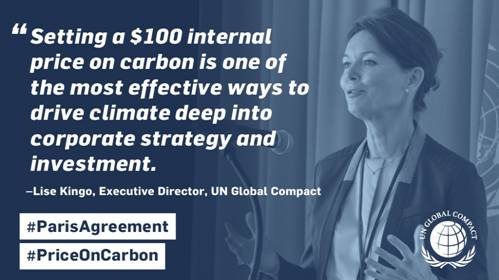 The UNFCCC’s Kyoto Protocol (1997) strongly grasped itself, as one of its fundamental elements, to the development of a market for carbon emissions. From that moment on, governments around the world have been increasingly pursuing market-based mechanisms to reduce CO2 emissions.
The UNFCCC’s Kyoto Protocol (1997) strongly grasped itself, as one of its fundamental elements, to the development of a market for carbon emissions. From that moment on, governments around the world have been increasingly pursuing market-based mechanisms to reduce CO2 emissions.
Despite the growing and recognized role of market mechanisms in climate mitigation and the call for carbon pricing in the Paris agreement by both governments and businesses, the agreement ended up making reference to carbon pricing only in a non-binding political section of the text, stating that countries "recognize the important role of providing incentives for emission reduction activities, including tools such as domestic policies and carbon pricing".
In this scenario, taking the challenge and with the aim of enabling the environment, on May 4th, the UNGC Executive Director, Lise Kingo, called on companies to set an internal carbon price at a minimum of $100 per metric ton over time*. The announcement was made just after the historic signing of the Paris Climate Agreement by over 165 United Nations Member States on April 22, New York - UN HQ.

The minimum threshold was identified following an intensive work with more than 70 companies already internalizing a price on carbon and committed to integrate it into corporate long-term strategies and investment decisions. In particular, the $100 per metric ton over time was recognized as the minimum “to spur innovation, unlock investment and shift market signals in line with the 2 to 1,5 degree Celsius pathway”. The UN Global Compact strongly pushes for companies, in particular those part of the Caring for Climate Initiatives, to be first-mover in the adoption of the 100$ price by 2020.
* The EU’s Emissions Trading Scheme, which is currently the biggest market of CO2 in the world, observed a sharp decrease in carbon pricing from almost 30 euros/tonne in 2008 to about 5 euros/tonne in 2014. Such a low price does not allow pursuing the goal for which the market was created: the promotion of investments in sustainable low carbon technologies and the recognition of companies producing more efficiently.
Additional references:
- Lise Kingo's Executive Update on Carbon Pricing
- The Executive Guide to Carbon Pricing Leadership – a Guide released by the Caring for Climate partnered with the World Resources Institute
- Learn more about Caring for Climate's carbon pricing work
